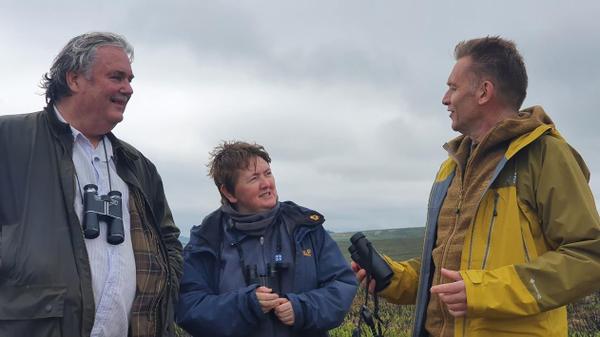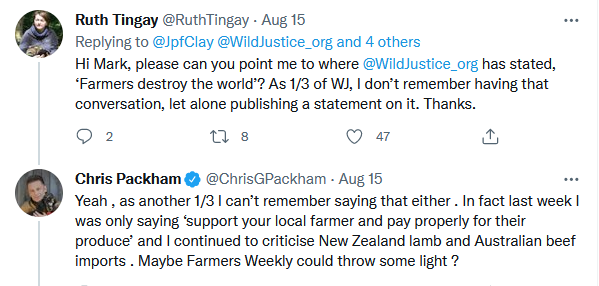Subject: Wild Justice 74 – news of a new Wild Justice project
Wednesday 18th August 2021Good morning! Our main news is an account of a project on pesticides on which we have been working for about a year. This is likely to form a significant part of our work over the next 12 months and we’ll need your help at times, please. Also, a quick update on our e-action and a snippet which explains one reason why we produce a newsletter.
1. Glyphosate:
Wild Justice has been looking at the compliance of local authorities with the regulations over the use of the herbicide glyphosate. We started this project last summer and, of course, coronavirus has slowed everything down, but we can now tell you more about it.
Herbicide use is, in theory, regulated, but so are many other issues by things as weak as codes of practice and as theoretically strong as legal requirements. Wild Justice’s experience is that it is one thing for something to be regulated in theory and quite another for that regulation to have an impact on the ground. In theory, killing of birds of prey is strongly regulated, in practice illegal killing continues at very high levels associated with some land uses. In theory, there are strict limits to the circumstances under which birds such as Jackdaws can be killed, but in practice these conditions are not respected in the countryside. We wondered whether glyphosate use by local authorities might be another such area.
We asked a sample of 43 local authorities in England and Wales about their use of glyphosate, their policies for pesticide reduction and the instructions they give their contractors. What we found was a staggeringly wide range of approaches. That’s what we thought we might find. Some local authorities have well-developed and impressive policies, others seem to give this issue little priority or attention – despite them all acting under the same regulatory framework.
Today we are telling you of five local authorities whose actions are impressively good as far as we can see. These are: Glastonbury, Frome, Croydon, Brighton and Hove, and Lewes and Eastbourne. If you live in these areas then we suggest you write to your council and tell them that you are pleased that they are at the top end of good practice and legal compliance.
There are also four local authorities who have, we believe as a result of Wild Justice’s enquiries, committed to improving their actions and we think these four, Redcar and Cleveland, Denbighshire, Norfolk and Milton Keynes, deserve some credit too. If one of them is your council then please do write to them and encourage them to make positive changes quickly.
Of the rest, there are some local authorities who have done a bit, but not very much. There are also some that we believe are behaving unlawfully and we shall be considering further action, including legal challenges, with our legal team over the summer. We have not named them here because we want them to consider their positions privately, but we will keep you updated on the actions we will take.
Our initial suspicions that this is an area where compliance with the regulations, and practice on the ground, differ enormously between local authorities, were confirmed. Clearly, if some local authorities can move very strongly away from using glyphosate then you have to wonder why many others don’t follow?
For more details on what we did, why we did it and what we will do next, read our blog on this subject published today – click here.
Wild Justice will be following up this initial examination of the situation in the following ways:
- Consideration of legal challenges against local authorities whose policies and practices we consider to be unlawful
- Further enquiries to local authorities, including some in Scotland and Northern Ireland.
- Praising those local authorities who are leading the way.
- Providing you, our supporters, with the resources to enquire into the actions of your own local authorities.
- Testing of food products for glyphosate residues.
So, you should expect to hear quite a lot more on this issue over the coming months and probably years.
2. E-action, short update:
Thank you for all the kind words about our Hen Harrier Day broadcast (you can catch up with it here) and thank you for responding to the e-action that was launched then. Responses are coming in from the political parties and we have posted examples from Plaid Cymru, Scottish Greens, Welsh Labour, Westminster Conservatives and Scottish Labour on our blog. We would be interested to see responses from other political parties and any exceptionally good or bad responses. Feel free to forward them to admin@wildjustice.org.uk. Thank you.
If you haven’t participated in the e-action yet, then please consider doing so. It is very easy to do, thousands of people have taken part and almost all the elected members of the Welsh, Northern Ireland and Scottish parliaments/assemblies have been contacted, and fewer than a handful of MPs in English constituencies remain unalerted to the issues too – click here to see a recent update on numbers and the link for your participation)
3. Why we send out a newsletter:
This newsletter is sent to over 50,000 subscribers and that number goes up and down as people join and leave but it has grown to that number in just two and a half years since Wild Justice was launched in February 2019. By subscribing you get our news in more detail and almost always quicker than anyone else.
In these newsletters we sometimes ask for your support – sometimes financially, sometimes in terms of actions – but it’s essentially a channel for us to tell you what we are doing, what we think and why we are doing what we do. We know that many of you forward these emails to your friends, that’s fine by us, and this is the link – click here – for new subscribers to sign up to get our newsletter automatically.
If you are active on social media you’ll find that Wild Justice is talked about an enormous amount by individuals and organisations who are not our biggest supporters. A lot of this chatter is complete nonsense, some of it is very unpleasant and some of it is malicious. Much of it is plain wrong.
Here’s a very recent example from Twitter where a farmer says that Wild Justice said something:
The farmer, @Jpfclay, couldn’t back up his claim, didn’t apologise and, despite being asked, hasn’t deleted his tweet. That’s the type of careless inaccurate and uncorrected commentary we get. Stick to this newsletter and you’ll know what we are doing and what we think – that’s the main reason we produce it. We like telling you our news!
That’s it for now. It’s possible that we may go a bit quiet for periods over the next three weeks as some of us are having some time off, some of the time we are going to be busy on other things and we are hoping to get some updates done to our website (we asked you what you’d like to see back in the spring and now we’re hoping to get some work done) which will take up our time.
Wild Justice (Directors: Mark Avery, Chris Packham and Ruth Tingay).




